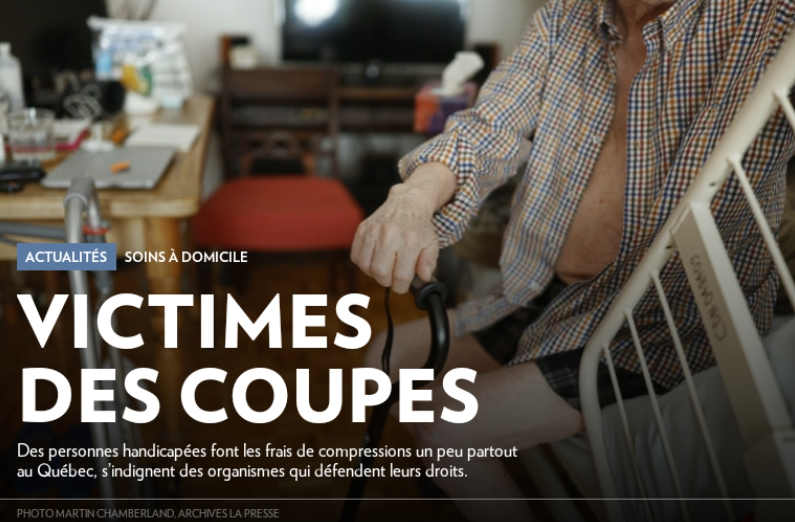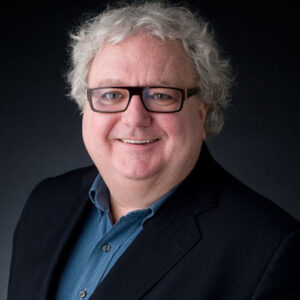Dear Allies,
First of all, I would like to thank all who responded to our fundraising campaign “With us as Champions in Aid in Living”. Unfortunately, we have been impacted by the Canada Post strike, which has delayed our campaign, the first campaign that we have launched in two years.
We are seeing a clear drop in donations
in comparison to our previous campaign.
If you haven’t already done so, we invite you to make a financial contribution to our campaign, either by returning the envelope you received in the mail, or by making an online donation via our website.
Thank you very much for your support – there is plenty of work to do in 2025!
Jasmin Lemieux-Lefebvre
Coordinator
Living in Dignity
“Coalition Services at Risk’’ is born

On December 16, a group of 17 national and regional disability rights organizations and their allies (including Living with Dignity) wrote an open letter entitled “When the most vulnerable pay the price of political choices” (to read the English version of the letter published by Les Coops de l’information and recall its signatories). Since then, two proposals to meet with Quebec Premier François Legault have been declined by his office.
As the Quebec National Assembly returns to session, the “Coalition Services en péril” makes its presence felt on the front page of La Presse+ this morning:
Soutien à domicile – Victimes des coupes / Home support – Victims of cuts
We also invite you to read this morning’s Radio-Canada report:
Compression en santé : des parents d’enfants handicapés brisent le silence / ‘Tightening the belt’ in the healthcare system: parents of disabled children break the silence
Help for the living must remain at the heart of our collective priorities!
MAiD in Quebec: report by the French TV program Envoyé spécial
Here is our initial reaction to the 9-minute introductory presentation of the report by the French TV program Envoyé spécial, to be broadcast this Thursday, January 30 on the public channel France 2. Read it in French in the comments on the YouTube video or below:
We hope that the many issues associated with opening the door to medical aid in dying (MAID) will be raised in your report on Thursday. As elsewhere where programmed death is legalized, the big issue is that one person’s freedom can become another person’s constraint…
Two points to clarify in your presentation:
a) at 4:40, since March 9, 2024, a severe physical impairment is an accepted criterion in Quebec. People with disabilities can therefore obtain it if they meet the other criteria of the law. The highly subjective criterion of “enduring and unbearable physical or psychological suffering (including existential suffering) that cannot be relieved under conditions the person considers tolerable” means that more and more people can access what the law calls “care” (terminology refuted in Quebec not only by MAiD critics, but also by providers).
b) at 5:17, even if some consider that it’s better not to propose it to patients, it’s a fact that medical aid in dying is now regularly proposed as one of the end-of-life care options to be considered, sometimes even as soon as a disease is diagnosed. One elderly woman even contacted us to mention that she had received three proposals for MAiD in the space of a few months, from three different resources in the Quebec healthcare network.
In short, the slippery slopes of medical aid in dying are a reality in Quebec, and France should not venture down them.

Death of Dr. Bernard Lapointe, a leading figure in palliative care
We have learned of the death of Dr. Bernard Lapointe on December 24. A leading figure in palliative care in Quebec and Canada, we paid tribute to him and offered our condolences to his loved ones on our blog, https://vivredignite.org/deces-du-dr-bernard-lapointe, on January 19.
Press Review
Living with Dignity on the podcast Les capés
Our coordinator took part for the 1st time in Les capés, a program hosted by Michel Bédard on CKIA FM 88.3 FM. This 10-minute interview is available on Facebook Live, starting at 6:00 pm.
There is a conversation about the issues associated with medical aid in dying and people with disabilities. With great respect, he recalls Jimmy James Grégoire-Pien’s story, which we wrote about in 2023.
Suffering from spinal muscular atrophy, Jimmy finally opted for medical aid in dying at the age of 22, on February 29. Our condolences go out to his family.
Like Richard Guilmette of the Mouvement Citoyen Handicap-Québec, we denounce “offering death before guaranteeing life”.
Assisted dying for Alzheimer’s patients: what’s the value of an advance request?
Philippe Lorange’s open letter in Le Journal de Montréal (in French)
Excerpt (our translation): “If we really care about the condition of patients, we need to think differently. Before even defending a so-called right to die with dignity, we should above all vigorously defend a right to live with dignity.”
Older People as a Burden? – A Cautionary Tale from Quebec on Medical Assistance in Dying
Editorial by Félix Pageau, published in the scientific journal Nursing Ethics:
https://journals.sagepub.com/doi/full/10.1177/09697330241312022
Excerpt:
“The dearth of geriatric experts could also result in inappropriate understanding and evaluation of a patient’s wishes when a non-expert oversees a patient’s advance requests for MAiD. Conflicts of interest for physicians, such as wanting to free up beds or reduce the average length of stay (LOS) in a hospital might unfortunately inform decisions about MAiD. Inheritance and family conflicts could also, consciously or not, impact decisions.”
Alzheimer’s and assisted dying: 119 requests in 2 months in Quebec
According to information from the Ministère de la Santé et des Services sociaux du Québec (MSSS) obtained by Radio-Canada journalists David Gentile and David Boily (in French):
https://ici.radio-canada.ca/nouvelle/2132632/alzheimer-aide-mourir-anticipee-caq
It would be interesting to know the number of reviews of advance requests for medical aid in dying during these first two months (119 is the number of completed forms). It should be remembered that at the opening on October 30, not all training courses were available. We hope to have a better picture in six months.
Already, there seems to be a problem with the use of the GAP (Guichet d’accès à la première ligne) to request an advance application for MAiD.
Recent communications from the Fédération des médecins omnipraticiens du Québec are enlightening on the subject (in French):
January 10 https://www.fmoq.org/dossier-actualites/demandes-anticipees-d-aide-medicale-a-mourir
January 17 https://www.fmoq.org/dossier-actualites/precisions-de-sante-quebec-sur-les-daamm-provenant-du-gap/
Daughter of Andrée Simard, widow of Robert Bourassa, satisfied with Québec Ombudsman’s findings
Many thanks to Michelle Bourassa for her “Death in Silence” initiative and two years of struggle in memory of her mother.
Text from Le Devoir (in French)
Her full open letter (in French) https://www.ledevoir.com/opinion/idees/834775/idees-il-faut-revoir-profondeur-processus-plainte-sante
We are grateful to the Québec Ombudsman (Protecteur du Citoyen) for its work, and we also invite Health Minister Christian Dubé to review the complaints process.
We’re glad the https://mortensilence.com website is still up and running!
Research project: Experiences of competent professionals when refusing MAiD requests
We’d like to share with you this research project by Alexandra Beaudin, Ph.D. candidate in Population Health at the University of Ottawa:
Are you a physician or specialized nurse practitioner who has previously refused requests for Medical Assistance in Dying (MAiD)?
Your participation would involve a one-on-one interview about your experience with MAiD refusals, as well as completing a short sociodemographic questionnaire.
Duration: Approx. 60 minutes
Location: Video conference (Teams) or In-person (depending on location)
Languages: French or English
All your responses will remain strictly confidential.
Interested? Have any questions?
Contact Alexandra Beaudin at abeau194@uottawa.ca.
JAN
2025

